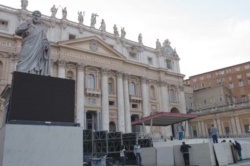Rome prepares for consistory
Vatican City is preparing itself for the consistory, which is set to occur in St. Peter’s Square on March 24.
More than 500 Boston-area Catholics have made their way to the Eternal City in order to partake of this event.
Speaking at a press conference at the Pontifical North American College in Rome March 21, Cardinal-designate Seán P. O’Malley reflected on the significance of the consistory for himself, for the archdiocese and for the universal Church.
Cardinal-designate O’Malley began the press conference thanking the media for enabling him “to be in contact with the Catholics in Boston so they can feel they are a part of this great event.”
On March 18, the cardinal-designate departed from Boston’s Logan International Airport, but not before holding a press conference.
“I’m anxious to get there, get it over with and get back,” he told reporters. The cardinal-designate also joked that “had I known I was going to be a bishop I’d have studied harder in the seminary.”
Since his arrival in Rome, Cardinal-designate O’Malley has been preparing himself for what lies ahead, being sized and measured for his scarlet robes, visiting with “the O’Malley clan” which arrived in Rome earlier in the week, and meeting with members of the Boston media.
On March 23, the eve of the consistory, he is scheduled to spend a day of prayer with the entire College of Cardinals as well as with Pope Benedict XVI, a day in which all the cardinals will be given an opportunity to voice any challenges they face within the Catholic Church.
“Myself being new on the College of Cardinals, I think it will be a good experience,” he said.
Admitting that the title of “Your Eminence” will have to “take some getting used to,” Cardinal-designate O’Malley appeared in good spirits, admitting that the reality of his becoming a cardinal is “really beginning to sink in.”
Cardinal-designate O’Malley is one of 14 bishops and one priest who will be installed at the consistory. The new cardinals represent 11 countries from four continents, which serves to underscore “the universality of the Church.”
At the consistory, Pope Benedict XVI will place a scarlet biretta on each of the cardinals’ heads, indicating the dignity of their office, and they will be assigned a church in Rome to be their title or deaconry, indicating their participation in the pastoral care of the pope for the city of Rome.
“Having a cardinal as the archbishop [of Boston] is a sign of the connectedness of the Church,” he said, adding that he hoped it would be an indicator to all Catholics “that the Church must go on” despite the recent turbulence within the archdiocese.
Historically, the role of a cardinal has been that of an advisor to the pope in the governance of the Church.As such, each of the new cardinals will be appointed by Pope Benedict XVI to serve on different dicastries or congregations. Saying he does not yet know which dicastries or congregations he will serve on, Cardinal-designate O’Malley placed his trust in the pontiff.
“The Holy Father knows what experiences I have had and what some of my strengths may be,” he said.
According to the cardinal-designate, the pope may not immediately name him to any dicastries or congregations because he may be “restructuring” some of the offices of the Curia.
However, he reiterated his commitment to the Archdiocese of Boston.
“I am hoping that the Holy Father will understand that Boston needs to be top priority,” he stated, stressing that “one of my hopes for the archdiocese is that we will be able to strengthen our Catholic schools.”
“I am happy this enterprise has already begun,” he added, referring to the archdiocesan initiative to bolster Catholic education.
The cardinal-designate also addressed questions about the dichotomy between his Capuchin rule of life and his new title of “prince of the Church.”
“In some ways it is an anomaly,” he admitted, noting that he will be the first Capuchin cardinal named since 1958, but indicated that there is “great enthusiasm” among his fellow friars.
Capuchins are called to be “lesser brothers” he explained, “to be a brother to the underprivileged, to the sick, to the poor.” The prestige of being a cardinal “in civil society … is not exactly the spirituality of St. Francis.” He quickly pointed out that although Capuchin cardinals are a rarity, there are many Capuchin bishops. In addition, St. Bonaventure — a famous Franciscan saint — was himself also a cardinal.
“As far as my own desire to live the Franciscan lifestyle, [becoming a cardinal] hasn’t changed a thing. That is still the most important thing for me,” said the cardinal-designate.
When asked how he would like to be addressed once he is a prince of the Church, he shrugged, “You can call me Cardinal Seán, Bishop Seán, Father Seán, Brother Seán. Whatever.”
<



















